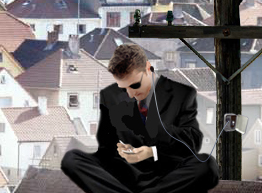The number of authorized intercept applications reported by year increased 168 percent between 2000 and 2010. The majority of the wiretaps have consistently been used for drug crime investigations, which accounted for 75 percent of intercepts in 2000 (894 applications) and 84 percent (2,678 applications) in 2010.
4,600 people were arrested based on the wiretap (and other electronic surveillance) orders. The conviction rate: 800, or 17%. That's down from 29.6% from a year ago.
It sure doesn't seem like we're getting much bang for the buck given the vast expenditure of resources and resulting erosion of our privacy rights.
Our houses are no longer secure. When we speak on the phone in our home, we should have an expectation of privacy. But if we call someone whose phone is tapped, they get to hear our calls too. They are supposed to stop monitoring if after 2 minutes the call hasn't turned to a discussion of illegal activity. I can't tell you how many non-drug conversations about women problems, issues with kids, talk about sporting events, the price of new car loans, etc, I've slogged through listening to the calls. And most drug investigations don't just wiretap one phone. One of my cases last year got 33 taps.
The other fave du jour technique this year is pole cameras. Since they don't go on your property, but attach it to a telephone pole or tree just outside it, they don't need a court order. They just leave it there for months, and it captures every person coming and going to your house. It's lazy surveillance, since no monitoring is required. They just turn it on and leave. There's so much footage, when its time to give it to us in discovery, it won't fit on dvd's and cd's, we're told to buy a 500 Gigabyte hard drive (about $100.) and they'll load it on for us.
On this 4th of July, it's always good to remember the words of William Pitt, and his speech to the House of Commons in 1741 (Timothy McVeigh gave it to me on a piece of paper one day when I visited him at the jail during his trial.)

I hope you readers, as law abiding citizens, will take a moment and think about all the electronic devices that spy on you and your movements and your locations every day, and ask yourselves, at what point will you stand up say "Sorry, this is too much." Especially when they're using it 85% of the time in drug, not terrorism investigations.
It's a good time to get rid of those old computers lying around. There are companies that will come and pick them up and send them to be recycled or destroyed for a cheap price. Better safe than sorry.






